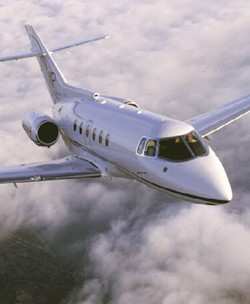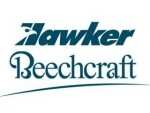Tue, May 04, 2010
Improved Aerodynamics, Upgraded Powerplants In The 800XPR
 Hawker
Beechcraft Services (HBS) Monday took the wraps off the aftermarket
Hawker 800XPR package, an upgrade for the Hawker 800XP. This
upgrade package, available only through factory-owned HBS
facilities, offers significant performance and capability
improvements by replacing the aircraft's original engines with new
technology TFE731-50R powerplants and improving aerodynamics with
company-designed winglets. Special introductory pricing is being
offered until the end of the year, with certification expected in
2010.
Hawker
Beechcraft Services (HBS) Monday took the wraps off the aftermarket
Hawker 800XPR package, an upgrade for the Hawker 800XP. This
upgrade package, available only through factory-owned HBS
facilities, offers significant performance and capability
improvements by replacing the aircraft's original engines with new
technology TFE731-50R powerplants and improving aerodynamics with
company-designed winglets. Special introductory pricing is being
offered until the end of the year, with certification expected in
2010.
"Customer input clearly told us that many Hawker 800XP owners are
interested in enhancing the value of their current aircraft
with improved range, better hot/high performance and lower
operating cost," said Christi Tannahill, HBC vice president, Global
Customer Support. "This factory upgrade underscores our commitment
to supporting our customers with products that improve performance,
lower operating costs and increase the resale value of the aircraft
we design and build."
The 800XPR's new TFE731-50R engines are capable of producing 5,000
pounds of thrust, but are flat rated to 4,660 pounds to create a
robust interstage turbine temperature margin that translates into
significantly improved performance and durability. This added
margin greatly improves hot/high airport performance while
generating more thrust at altitude. The new engines also deliver a
number of green advantages, such as lower noise levels, reduced
specific fuel consumption and reduced carbon emissions.
Hawker says that 800XPR operators should see lower operating costs
as compared to the 800XP through the incorporation of 70 design and
material improvements to the TFE731-50R, which delivers a seven
percent reduction in specific fuel consumption while increasing
maintenance intervals. The result is a 32 percent reduction in
Honeywell's minimum Maintenance Service Plan (MSP) costs thanks to
major periodic inspections of 3,000 hours and core zone inspection
intervals of 6,000 hours as compared to 2,100 and 4,200
respectively on the original engines. The 800XPR upgrade qualifies
for zero-cost enrollment in Honeywell's MSP.
 The
aerodynamics of 800XPR winglets work synergistically with the new
engines to yield greater range, better time to climb and faster
cruise speeds. The winglets effectively increase the wing aspect
ratio, which reduces lift induced drag. In slow flight, the
winglets generate more responsive handling while enhancing
stability at altitude.
The
aerodynamics of 800XPR winglets work synergistically with the new
engines to yield greater range, better time to climb and faster
cruise speeds. The winglets effectively increase the wing aspect
ratio, which reduces lift induced drag. In slow flight, the
winglets generate more responsive handling while enhancing
stability at altitude.
In high/hot conditions, the 800XPR will climb directly to FL410 at
maximum takeoff weight in just 25 minutes and will reach FL370 a
full three minutes faster than the Hawker 800XP. That direct climb
capability, combined with the airplane's improved fuel efficiency,
translates into true transcontinental range and faster block
times.
An optional 800XPR avionics upgrade is planned to feature large
format displays, integrated with the Hawker 800XP's autopilot and
designed to be compatible with future technology breakthroughs and
regulatory mandates. Benefits will include improved situational
awareness, greater reliability and reduced weight.
More News
Aero Linx: Aviators Code Initiative (ACI) Innovative tools advancing aviation safety and offering a vision of excellence for aviators. The ACI materials are for use by aviation pra>[...]
Make Sure You NEVER Miss A New Story From Aero-News Network Do you ever feel like you never see posts from a certain person or page on Facebook or Instagram? Here’s how you c>[...]
From 2016 (YouTube Edition): Who You Gonna Call When You Have a Rocket Engine that Needs a Spacecraft? While at EAA AirVenture 2016, ANN CEO and Editor-In-Chief, Jim Campbell, sat >[...]
"In my opinion, if this isn't an excessive fine, I don't know what is... The odds are good that we're gonna be seeking review in the United States Supreme Court. So we gotta muster>[...]
Expedite Used by ATC when prompt compliance is required to avoid the development of an imminent situation. Expedite climb/descent normally indicates to a pilot that the approximate>[...]
 ANN's Daily Aero-Linx (04.30.25)
ANN's Daily Aero-Linx (04.30.25) ANN FAQ: Turn On Post Notifications
ANN FAQ: Turn On Post Notifications Classic Aero-TV: Agile Aeros Jeff Greason--Disruptive Aerospace Innovations
Classic Aero-TV: Agile Aeros Jeff Greason--Disruptive Aerospace Innovations Aero-News: Quote of the Day (04.30.25)
Aero-News: Quote of the Day (04.30.25) ANN's Daily Aero-Term (04.30.25): Expedite
ANN's Daily Aero-Term (04.30.25): Expedite




